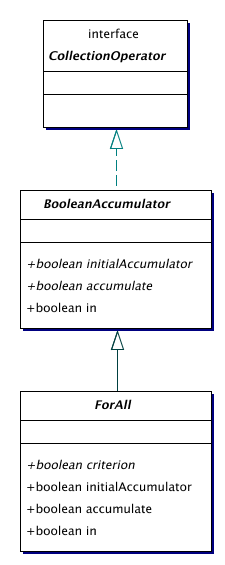org.jutil.java.collections
Class ForAll
java.lang.Object
|
+--org.jutil.java.collections.BooleanAccumulator
|
+--org.jutil.java.collections.ForAll
- All Implemented Interfaces:
- CollectionOperator
- public abstract class ForAll
- extends BooleanAccumulator
A boolean for-all operator.

A convenience accumulator of collections that checks whether all
elements of a collection satisfy the criterion defined in the abstract
method public boolean criterion(Object element).
As with Accumulator, this class can best be used as an anonymous
inner class.
boolean bool =
new ForAll() {
/oo
o also public behavior
o
o post (* additional precondition for criterion method *)
o
o public model boolean isValidElement(Object element);
o/
/oo
o also public behavior
o
o post \result == ((MyType)element.someProperty() ...)
o/
public boolean criterion(Object element) {
// criterion code
}
}.in(collection);
|
Method Summary |
boolean |
accumulate(java.lang.Object element,
boolean acc)
|
abstract boolean |
criterion(java.lang.Object element)
Check whether the given object satisfies the criterion
for this ForAll accumulator. |
boolean |
in(java.util.Collection collection)
Perform the accumulation defined in
public boolean accumulate(Object element, boolean acc) for each
element of . |
boolean |
initialAccumulator()
|
| Methods inherited from class java.lang.Object |
clone, equals, finalize, getClass, hashCode, notify, notifyAll, toString, wait, wait, wait |
CVS_REVISION
public static final java.lang.String CVS_REVISION
ForAll
public ForAll()
criterion
public abstract boolean criterion(java.lang.Object element)
- Check whether the given object satisfies the criterion
for this ForAll accumulator.
- Specifications:
-
public behavior
requires isValidElement(element);
ensures ( \forall Object o1; ; ( \forall Object o2; o2.equals(o1); criterion(o1) == criterion(o2)));
initialAccumulator
public final boolean initialAccumulator()
- Specifications:
- also
-
public behavior
ensures \result == true;
- Specifications inherited from overridden method in class BooleanAccumulator:
--- None ---
accumulate
public final boolean accumulate(java.lang.Object element,
boolean acc)
- Specifications:
- also
-
public behavior
ensures \result == (acc&&criterion(element));
- Specifications inherited from overridden method in class BooleanAccumulator:
-
public behavior
requires isValidElement(element);
in
public boolean in(java.util.Collection collection)
- Description copied from class:
BooleanAccumulator
Perform the accumulation defined in
public boolean accumulate(Object element, boolean acc) for each
element of . For the first element, the object returned by
public boolean initialAccumulator() is used as accumulator.
For the other elements, the result of the application of
public boolean accumulate(Object element, boolean acc) on the
previous element is used as accumulator.
The contents of is not changed.
The result of this method is the object returned by the application of
public boolean accumulate(Object element, boolean acc) on the
last element of the collection to be processed.
The precondition is variable. Subclasses could strengthen the postcondition
of isValidElement. To the user, this means that this method cannot be called
safely in a polymorphic context, since she has no idea what the actual
precondition will become in subclasses. This can be resolved by making
the model method isValidElement final in the polymorph supertype she needs
to use.
- Specifications:
- also
-
public behavior
ensures \result == ( \forall Object o; collection.contains(o); criterion(o));
- Specifications inherited from overridden method in class BooleanAccumulator:
-
public behavior
requires ( \forall Object o; collection.contains(o); isValidElement(o));
ensures (* the result of the accumulation is returned *);
ensures collection == null ==> \result == initialAccumulator();
signals (ConcurrentModificationException) (* The collection was modified while accumulating *);

